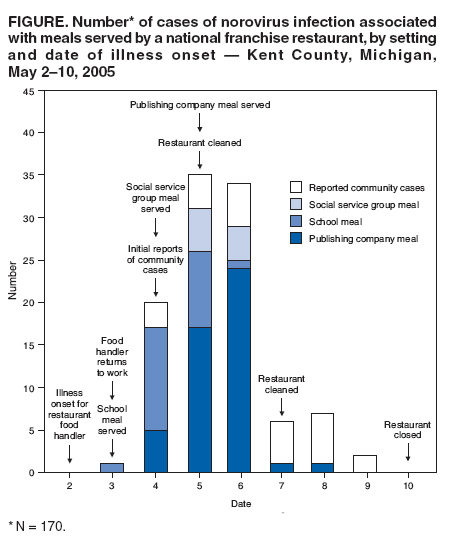If you're in the food service industry, don't go back to work while you still have an intestinal bug. Or, fer crimeny's sake, at least wash your hands thoroughly.
The majority of cases of foodborne gastroenteritis in the United States are caused by noroviruses. This report summarizes an investigation by the Kent County Health Department (KCHD) in Michigan into three norovirus outbreaks and a cluster of community cases that were associated with a national submarine sandwich franchise restaurant during May 3--9, 2005. The investigation identified a potential source, a food handler who had returned to work within a few hours of having symptoms of gastrointestinal illness while he was still excreting norovirus in his stools.
Apparently, over 100 people, including cases who picked up food at the restaurant and 3 separate parties who ordered party subs, were sickened by the virus, spread by the worker (who washed and cut lettuce for each of the party subs). CDC has a nice figure showing the epidemic curve:

You can see that even cleaning the restaurant didn't stop the epidemic. This is probably partly because people had been exposed prior to the cleaning, but it's also because noroviruses are just incredibly difficult to get rid of. It's this family of viruses that has been responsible for many outbreaks of diarrheal illness on cruise ships and other public places. They're spread in a fecal-oral manner: stool particles contaminate unwashed or poorly washed hands, get into your food, and into your intestine, starting the process all over. Vomit from infected indiviuals can also contain contagious particles, and infected indiviuals can continue to shed virus up to 3 weeks after symptoms subside. Careful handwashing or other practices (such as wearing gloves when preparing food) can minimize spread, but unless the restaurant (or entire cruise ship) is very carefully cleaned to remove environmental virus, everything can be easily re-contaminated by residual virus.
So, unless you want to be a typhoid Mary at your workplace (or just at your backyard BBQ), keep those hands clean--and don't forget about underneath your fingernails.

We seem to be having a small outbreak of Hep A here in the Bluegrass State, especially in Fayette County. There were 14 at last count, including some school kids. Health officials have not pinpointed the source, but suggest someone (restaurant worker?) may not have washed his/her hands.
Tara,
I applaud you bringing this up, but I wouldn't go so far as to say that food services workers should stay home. It simply isn't that easy.
1. Food Service workers likely make Minimum Wage or near
2. At Minimum wage, every last penny you can make must be earned
3. Food Service workers are hourly
4. Food Service workers rarely have sick time
5. Food Service workers rarely have health care
6. Calling in sick leads to getting fired or at least poor shift choices
All of this means, that they're not going to miss work; they can't afford to miss it.
This should fall on the owners and managers. They have the most to loose: customers. They should be offering at the minimum a certain amount of sick time. They should be monitoring their employees to make sure they aren't sick at work. My employer (a software company, not food service) WANTS me to stay home when I'm sick. They don't want me to infect other employees and they no I won't be productive. That's why I get my 10 days and health care.
Are they fines today if the health department catches a sick employee on the line?
As a leftist communist whack job, I'd love to see legislation on this (not to mention health care, etc).
Tara writes:
The wife and I sometimes partake in cruising. Let's say we are on a ship, essentially trapped, and then a GI illness breaks out. Other than washing our own hands scrupulously, what other strategies could we use to minimize our risk (assuming the ship's staff is already taking every measure they can)?
This is why I avoid buffets like the plauge. An outbreak in my home state of Montana.
Chris,
I agree it's not that easy. I'm all too familiar with everything you brought up, as I waitressed ($2.13/hr + tips) and worked in the college dining halls for many years in high school and college (and supplement my stipend during grad school). I've had mixed experience with management and sick leave policy. Indeed, it would be best for everyone involved if reasonable--and compensated--leave was given for illness, since incidents like this not only result in diminished business in the short term, but also in the long term as the particular restaurant gets a reputation that can be difficult to shake. I don't know about fines and that would likely vary from area to area anyway, but it would be a good place to start. Mike has some comments along the same lines you discuss here.
Dave--therein lies the problem, and why it's been such a notable issue on cruises. Even washing *your* hands won't protect you if, say, the food is contaminated by a worker. And obviously, you have to eat. I'm not generally a fan of hand sanitizers, but I'd probably take along a bottle of that as well, for times you're away from a sink. Beyond that, not much you can do, unfortunately.
Well said, Chris! 4-6 in particular are relevant here. I know too many people for whom hourly work is their livelihood and missing work would mean losing their job, unlike it was for me years ago when I worked as a baker for a summer to get some spending money for college and still lived under my parents' roof.